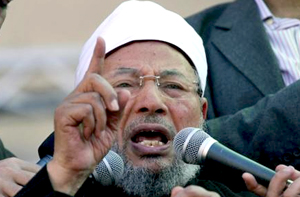 Dubai, Feb 3: The UAE Foreign Ministry on Sunday said it had summoned Fares Al Nuaimi, Qatar’s ambassador to the UAE, to protest its inaction on stopping a cleric from continuing to insult the UAE.
Dubai, Feb 3: The UAE Foreign Ministry on Sunday said it had summoned Fares Al Nuaimi, Qatar’s ambassador to the UAE, to protest its inaction on stopping a cleric from continuing to insult the UAE.
Dr Anwar Mohammad Gargash, Minister of State for Foreign Affairs, expressed the UAE Government’s “extreme resentment” over Yousuf Al Qaradawi’s statement against the UAE that was aired on Qatari state TV, WAM reported.
“We have held back so that our neighbour can clearly reject such insult, extend sufficient clarifications and guarantee that such provocation and defamation will not recur.
"While the UAE fully respects the freedom of speech, it condemns any talk that incites hatred and violence. Unfortunately, calmness and restraint did not draw the right response from our brothers in Qatar,” Gargash said.
The Egyptian-born Al Qaradawi, speaking live on Qatari state TV from a Doha mosque, criticised the UAE for supporting the current Egyptian government. He claimed that the UAE “has always been opposed to Islamic rule”.
He was talking about the developments in Egypt that followed the ouster of former president Mohammad Mursi last July by a popular uprising.
Al Qaradawi said the new Egyptian administration was “ruling against Allah’s will” and that Mursi must be reinstated to realise a government by Islamic rule.
Gargash condemned the comments and wrote on his official twitter account it was “shameful that we allow Al Qaradawi to continue his insults of the UAE and ties [that bind] the peoples of the Arabian Gulf.”
Gargash said: “We endeavoured to contain the issue out of our interest in relations between the two sisterly countries and to abort discord and sedition instigated by that cleric in his campaign against the UAE. But, we wee forced to take this unprecedented step in our Gulf relationship, given our brothers in Qatar did not reject that their media and religious outlets be used to attack neighbours and sisterly countries.”
Gargash stressed it was unacceptable by all means that dignity of the UAE, its leaders and people as well as its time-honoured values be harmed under any execuses.
Condemning Egypt’s recent blasts, the UAE called for action to counter terror.
Shaikh Abdullah Bin Zayed, Foreign Minister, expressed the UAE solidarity with the government of Egypt. He also renewed UAE’s stance on standing by Egypt in fighting extremism and terrorism.
Shaikh Abdullah urged the countries that oppose terrorism to stand by the Egyptian government “in the face of this terrorist organisation and what it stands and calls for”.
“The terrorist organisation’s continued acts of terror and killing in Egypt require a swift action by all to eliminate these criminal acts which are carried out under the guise of Islam and which are rejected by Islam and Muslims.”
Qatar’s foreign minister has said that Al Qaradawi do not reflect Qatar’s foreign policy.
In an interview to Qatar Television on Friday evening, Khalid Bin Mohammad Al Atiyyah said: “The foreign policy of Qatar is expressed and conveyed only through the official channels of the state. Qatar’s policy is not expressed or conveyed by the media or platforms here and there. What was said by Shaikh Yousuf Al Qaradawi does not reflect the foreign policy of the state of Qatar. We do have full love and respect for our brothers in the UAE. Relations between Qatar and the UAE are strategic and the security of the UAE is at the same time the security of Qatar.”
His statement came days after the UAE called upon Qatar to stop Al Qaradawi from continuing to insult the UAE.
Dr Abdul Khaleq Abdullah, a leading political analyst, said the UAE’s unprecedented move showed its extreme dissatisfaction with Doha over its failure to rein in Al Qaradawi.
“It seems that Qatar was more interested in Al Qaradawi than its relations with the UAE, which hit back prompted by its self-confidence and pride,” Dr Abdullah said, citing similar firm stands in the case of Canada and Turkey.





Comments
Add new comment